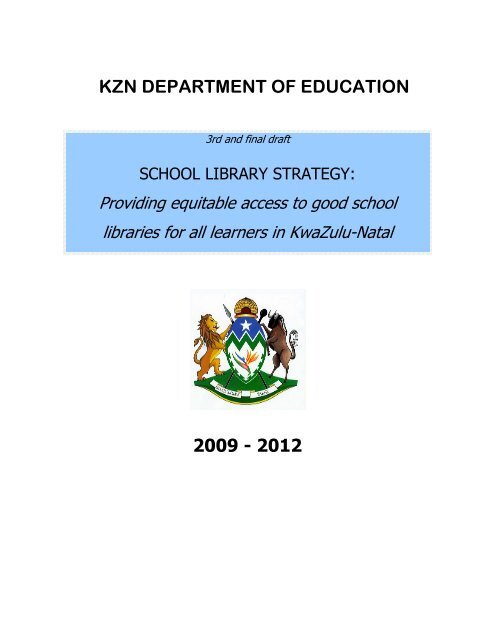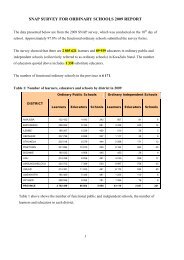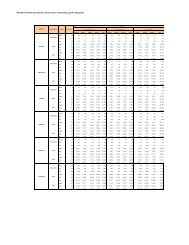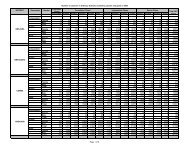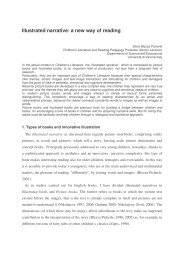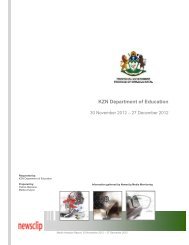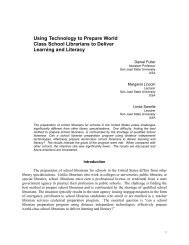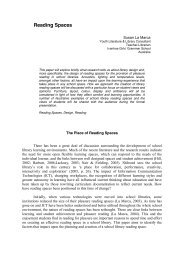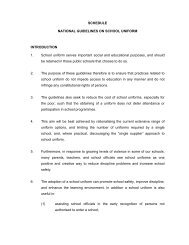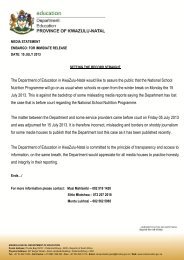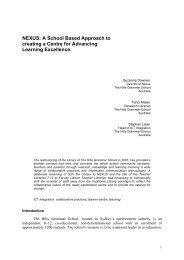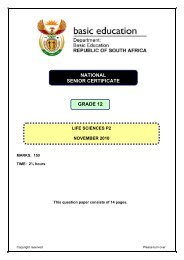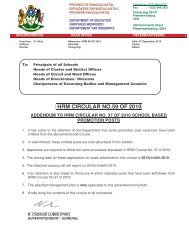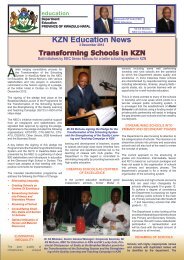School Library Strategy - KwaZulu-Natal Department of Education
School Library Strategy - KwaZulu-Natal Department of Education
School Library Strategy - KwaZulu-Natal Department of Education
You also want an ePaper? Increase the reach of your titles
YUMPU automatically turns print PDFs into web optimized ePapers that Google loves.
KZN DEPARTMENT OF EDUCATION<br />
3rd and final draft<br />
SCHOOL LIBRARY STRATEGY:<br />
Providing equitable access to good school<br />
libraries for all learners in <strong>KwaZulu</strong>-<strong>Natal</strong><br />
2009 - 2012
EXECUTIVE SUMARY<br />
The mandate <strong>of</strong> <strong>Education</strong> <strong>Library</strong>, Information and Technology Services (ELITS)<br />
permeates all curricular and co-curricular activities within a school. This mandate<br />
is to provide schools with quality library, information and technology resources<br />
and ensure effective management and utilisation <strong>of</strong> these resources. The<br />
resources that we promote are basically teaching and learning resources that<br />
support the curriculum, which requires learners generate knowledge through<br />
interaction with a number <strong>of</strong> resources. A school library generally serves as a base<br />
<strong>of</strong> diverse information resources that range from print, visual, audio-visual to<br />
electronic resources.<br />
This strategy is informed by the provincial <strong>School</strong> <strong>Library</strong> Policy, published in<br />
2003, and the Reading Policy Guidelines, published in 2005. It is also linked to the<br />
KZN <strong>Department</strong>al Master Strategic Plan.<br />
Broadly speaking there are THREE themes which this document addresses. These<br />
themes are aligned to the main programmes <strong>of</strong> the directorate:<br />
<strong>School</strong> <strong>Library</strong> Development Programme [SLDP]<br />
Information Skills and ICT Programme<br />
Reading Programme<br />
It has four sections namely:<br />
• The first section highlights in a nutshell the role <strong>of</strong> school libraries, establishes<br />
ELITS vision and mission statements and relates them to the <strong>Department</strong> vision<br />
and mission statements and gives a comprehensive picture <strong>of</strong> the KZN context<br />
in relation to school libraries.<br />
• The second section examines the ten ELITS priority areas.<br />
• The third section matches strategic issues to objectives, key targets, costs and<br />
time frames.<br />
KZN <strong>School</strong> <strong>Library</strong> <strong>Strategy</strong> 2009-2012<br />
1
• The fourth section deals with monitoring and evaluation <strong>of</strong> each operational<br />
strategy.<br />
KZN <strong>School</strong> <strong>Library</strong> <strong>Strategy</strong> 2009-2012<br />
2
CONTENTS PAGE<br />
PART 1: BACKGROUND AND CONTEXT OF THE STRATEGY ............................................4<br />
1.1 INTRODUCTION............................................................................................4<br />
1.2 STRATEGIC INTENT ......................................................................................4<br />
1.3 MISSION SUCCESS FACTORS.........................................................................5<br />
1.4 SCHOOL LIBRARIES IN THE KZN CONTEXT ....................................................6<br />
1.5 STRATEGIC DRIVERS ....................................................................................8<br />
PART 2: STRATEGIC ISSUES ........................................................................................9<br />
2.1 PROVIDING QUALITY LIBRARY RESOURCES ........................................................9<br />
2.2 TRAINING SCHOOLS ON EFFECTIVE MANAGEMENT AND UTILISATION OF LIBRARY<br />
RESOURCES.............................................................................................................9<br />
2.3 PROMOTING INTEGRATION OF INFORMATION LITERACY SKILLS INTO THE<br />
CURRICULUM...........................................................................................................1<br />
2.4 PROMOTING READING FOR INFORMATION AND PLEASURE .................................2<br />
2.5 MANAGING A MOBILE LIBRARY SE RVICE............................................................2<br />
2.6 PROMOTING ICT IN SCHOOL LIBRARIES.............................................................3<br />
2.7 DEVELOPING AND SUPPORTING EDUCATION CENTRES [CLUSTER MODEL] ..........3<br />
2.8 AWARDING BEST SCHOOL LIBRARIES.................................................................3<br />
2.9 ACCELERATED SLDP - 25 SCHOOLS PROJECT ......................................................4<br />
2.10 NETWORKING AND PARTNERSHIPS ..................................................................4<br />
PART 3: SUMMARY OF THE KEY ISSUES AND SPECIFIC TARGETS ..................................6<br />
PART 4: MONITORING AND EVALUATION.....................................................................8<br />
KZN <strong>School</strong> <strong>Library</strong> <strong>Strategy</strong> 2009-2012<br />
3
PART 1: BACKGROUND AND CONTEXT OF THE STRATEGY<br />
1.1 INTRODUCTION<br />
The school library purports to fulfil various information needs <strong>of</strong> learners and educators<br />
within the parameters <strong>of</strong> curriculum development and enrichment. To fulfil this purpose,<br />
the ELITS directorate aims at guiding the establishment, development and sustainability<br />
<strong>of</strong> school libraries in the province by:<br />
• Providing a core collection <strong>of</strong> quality library resources<br />
• Providing pr<strong>of</strong>essional development and support for school management teams,<br />
teacher-librarians, librarians and library assistants in the management and effective<br />
utilisation school library resources.<br />
This document discusses various ways <strong>of</strong> meeting users’ information needs. It informs<br />
and guides educators and school management teams on school library matters in order to<br />
enable them to develop a school library that is characterised by efficiency and<br />
effectiveness.<br />
A good school library has to meet certain criteria and acceptable standards in order to<br />
achieve it goals. The minimum standards are:<br />
Adequate and relevant collection for all users, which is properly arranged,<br />
managed and made accessible to all<br />
Adequate space for housing the collection<br />
An effective school library programme to ensure effective utilisation <strong>of</strong> library<br />
material<br />
1.2 STRATEGIC INTENT<br />
The <strong>Department</strong>’s vision seeks to create “a literate and skilled society, which is<br />
capable <strong>of</strong> participating in all democratic processes and contributing to the<br />
development and growth <strong>of</strong> the people <strong>of</strong> <strong>KwaZulu</strong>-<strong>Natal</strong>” [KZNDoE, 2007].<br />
Among a number <strong>of</strong> literacies such as mathematical literacy, visual literacy,<br />
cultural literacy, information literacy, scientific literacy, political literacy and<br />
language literacy that exist; the ELITS directorate focuses on Information Literacy<br />
as a prerequisite <strong>of</strong> the 21 st century citizens. Linked to Information Literacy, are<br />
Information Skills, which are a sub-set <strong>of</strong> Information Literacy. The core purpose<br />
<strong>of</strong> the <strong>Department</strong> is encapsulated in its mission statement, which is provision <strong>of</strong><br />
KZN <strong>School</strong> <strong>Library</strong> <strong>Strategy</strong> 2009-2012<br />
4
opportunities for accessing quality education. Part <strong>of</strong> accomplishing the mission,<br />
the ELITS directorate provides physical and intellectual access to diverse and upto-date<br />
library resources for effective teaching and learning that are guided by a<br />
sound school library programme.<br />
1.3 MISSION SUCCESS FACTORS<br />
The six domains on the role <strong>of</strong> the school library, which this document focuses on, are in<br />
relation to school library focus areas or activities namely; resources i.e. reference<br />
material; subject literature (non-fiction) and fiction; study space; library and information<br />
skills; research, reading; and Information and Communication Technologies (ICTs). The<br />
following diagram gives an illustration:<br />
Study space<br />
Quality<br />
resources<br />
Research<br />
SCHOOL<br />
LIBRARY<br />
ICTs<br />
Reading<br />
<strong>Library</strong> &<br />
Information skills<br />
KZN <strong>School</strong> <strong>Library</strong> <strong>Strategy</strong> 2009-2012<br />
5
The value <strong>of</strong> a school library is educational, developmental and recreational in<br />
nature. It is to:<br />
• Provide learners and teachers with a wide range <strong>of</strong> quality library resources for<br />
curriculum development and enrichment, academic excellence as well as different<br />
teaching and learning styles.<br />
• Facilitate teaching <strong>of</strong> library and information skills that enables learners to be<br />
information literate.<br />
• Promote reading for information and pleasure as a fundamental skill for lifelong<br />
learning.<br />
• Promote use <strong>of</strong> Information and Communication Technology [ICT] as a modernised<br />
tool for acquiring information.<br />
• Provide a suitable environment for self-directed studying and independent learning.<br />
• Provide adequate functional facilities for group work and/or entire class-work.<br />
1.4 SCHOOL LIBRARIES IN THE KZN CONTEXT<br />
1.4.1 Legislative Environment<br />
The directorate operates within the framework <strong>of</strong> following legislation and policies:<br />
KZN <strong>School</strong> <strong>Library</strong> Policy <strong>of</strong> 2003<br />
This policy propagates 3 school library models that a school can opt for, namely;<br />
Classroom Collections<br />
Central Collections<br />
Cluster Collections<br />
The school considers its own facilities and resources to make an informed decision on<br />
what model to implement. These models are complementary.<br />
KZN Reading Policy Guidelines <strong>of</strong> 2005<br />
Each school is expected to develop a Reading Programme that explains how a school will<br />
promote reading for information and pleasure. The Reading Programme is informed by<br />
the principles articulated in the Reading Policy Guidelines and will be supported by<br />
reading materials and relevant training.<br />
National <strong>Education</strong> Policy Act <strong>of</strong> 1996<br />
KZN <strong>School</strong> <strong>Library</strong> <strong>Strategy</strong> 2009-2012<br />
6
For various school phases Information Skills is featured as one <strong>of</strong> the optional<br />
instructional subject/ compulsory instructional <strong>of</strong>ferings that are not necessarily examined<br />
i.e.<br />
Foundation Phase: Grade 3 under category 9<br />
Intermediate Phase: Grade 4 under category 12<br />
Grade 5 and 6 under category 11 and 12<br />
Senior Phase: Grade 7 under category 11<br />
Grade 8 and 9 under category 12<br />
FET Phase: Grade 10—12 under category 7-10<br />
1.4.2 Service Delivery Environment<br />
The KZN <strong>Department</strong> <strong>of</strong> <strong>Education</strong> serves a number <strong>of</strong> schools, which are located mostly<br />
in rural areas. It has 5 651 schools (<strong>Department</strong> <strong>of</strong> <strong>Education</strong>, 2006), which need access<br />
to good school libraries. To date ELITS has managed to provide core collections for 2794<br />
schools that have learner enrolment that ranges between 1 and 500. However, the<br />
aforementioned category <strong>of</strong> schools has not yet been completed since the programme is<br />
being rolled out.<br />
1.4.3 Resource capabilities and deficiencies<br />
The directorate has personnel at Head Office and Districts. Head Office personnel has 90<br />
<strong>of</strong>ficials namely; Director (1), Personal Assistant (1), Administration Clerk (1), Chief<br />
<strong>Education</strong> Specialists (2), Deputy Chief <strong>Education</strong> (6), Senior <strong>Education</strong> Specialists (4)<br />
who are responsible for the ELITS Processing Centres, Librarians (4), Drivers (4) and<br />
library assistants (68). District <strong>of</strong>ficials consist <strong>of</strong> Senior <strong>Education</strong> Specialists (2), Deputy<br />
Chief <strong>Education</strong> Specialist (1) and Administration Clerk (1); which is an unfair allocation<br />
resulting in a ratio <strong>of</strong> one advisor per 235 schools.<br />
<strong>School</strong>s have no designated teacher-librarian posts. This situation is a serious challenge<br />
that needs urgent attention. However, despite the fact that school libraries are operating<br />
without teacher-librarian posts, the KZNDoE is funding 200 teachers per year to get an<br />
Advanced Certificate in <strong>Education</strong> [ACE] specialising in <strong>School</strong> <strong>Library</strong> Development. At<br />
present there are 409 students who are doing either first or second year and 230<br />
graduands have completed.<br />
KZN <strong>School</strong> <strong>Library</strong> <strong>Strategy</strong> 2009-2012<br />
7
The <strong>Department</strong> has a minimal number <strong>of</strong> schools that have designated library spaces. In<br />
2007/8 financial year 167 media centres were built as part <strong>of</strong> the Upgrades and Additions<br />
Programme.<br />
1.5 STRATEGIC DRIVERS<br />
KZN <strong>School</strong> <strong>Library</strong> <strong>Strategy</strong> 2009-2012<br />
8
PART 2: STRATEGIC ISSUES<br />
2.1 PROVIDING QUALITY LIBRARY RESOURCES<br />
The process <strong>of</strong> acquiring school library resources involves the following major steps:<br />
• Constitution <strong>of</strong> the Selection Committee by 24 teacher-librarians from 12<br />
districts i.e. one from primary and one from secondary schools.<br />
• Organising an exhibition that is done twice a year by a number <strong>of</strong> booksellers.<br />
• Identifying 500 schools that are going to receive from the annual budget. This<br />
is informed by the ELITS implementation plan.<br />
• Processing and distributing procured library material for targeted schools.<br />
The core collection that schools receive serves as a starter collection for establishing a<br />
functional school library. It ranges from R50 000-R100 000 depending on the learner<br />
enrolment and consists <strong>of</strong>:<br />
• Dictionaries<br />
• Encyclopaedias<br />
• Charts, maps, globes<br />
• DVDs<br />
• Subject literature i.e. Nonfiction<br />
• Electronic resources e.g.<br />
• Fiction<br />
CDROMs<br />
SLDP Hand-over functions are organised for all schools that are targeted to receive<br />
school library material where the <strong>Department</strong>al explains <strong>Department</strong>al and ELITS<br />
expectations that schools must execute. This is an advocacy strategy as well as an<br />
information session on school library matters.<br />
2.2 TRAINING SCHOOLS ON EFFECTIVE MANAGEMENT AND UTILISATION OF<br />
LIBRARY RESOURCES<br />
The 500 schools that are identified to receive the core collection receive proper training<br />
on the management and utilisation <strong>of</strong> the collection. The school is visited at least twice a<br />
year by the ELITS advisor for pr<strong>of</strong>essional development and support. The teacher-librarian<br />
attends a minimum <strong>of</strong> three workshops on:<br />
Managing the <strong>Library</strong> Collection<br />
Information Skills<br />
Reading Promotion Strategies<br />
KZN <strong>School</strong> <strong>Library</strong> <strong>Strategy</strong> 2009-2012<br />
9
Extra training may be provided through the help <strong>of</strong> a service provider. The budget for<br />
training comes from Skills Development levy.<br />
Advisors conduct information sessions for principals to share our strategies, solicit<br />
principals’ support and define principals’ role on developing school libraries.<br />
The ELITS annual conference also provides pr<strong>of</strong>essional development and support<br />
through keynote speakers and other specialists who are knowledgeable on the field.<br />
Furthermore, the conference has workshops and case studies presented by teachers to<br />
teachers on pertinent issues.<br />
2.3 PROMOTING INTEGRATION OF INFORMATION LITERACY SKILLS INTO THE<br />
CURRICULUM<br />
Information literacy skills can be categorised into two groups namely;<br />
• Skills that are instrumental involving utilisation <strong>of</strong> the school library such as<br />
locating and collecting information. Such skills are merely basic library skills such<br />
as information retrieval skills or how library material is classified and catalogued or<br />
how to find information in the library.<br />
• Skills that are cognitive in nature such as analysing, synthesising, evaluating and<br />
presenting. Such skills go beyond finding information to how information can be<br />
used effectively. It takes into cognisance issues <strong>of</strong> ethical usage <strong>of</strong> information as<br />
well as reaching the highest level <strong>of</strong> using information in order to generate<br />
knowledge.<br />
Information literacy skills are essential for the 21 st century because they empower<br />
learners to meet the international standards <strong>of</strong>:<br />
Recognizing a need for information<br />
Accessing needed information effectively and efficiently<br />
Evaluating information and its sources critically<br />
Incorporating selected information into his/her knowledge base<br />
Using information effectively to accomplish a specific purpose<br />
Understanding economic, legal and social issues; use information ethically and legally. Ethical use<br />
refers to respect for people’s beliefs, cultures, and dignity. Legal use refers to issues <strong>of</strong> copyright,<br />
and respect for people’s intellectual property.<br />
KZN <strong>School</strong> <strong>Library</strong> <strong>Strategy</strong> 2009-2012<br />
1
Recognizing that lifelong learning and participative citizenship require information literacy<br />
To promote integration <strong>of</strong> Information Literacy Skills into the curriculum, the Directorate<br />
has engaged the following methodologies:<br />
• Developing Educators’ Guide, which is used for training schools on how to teach<br />
Information Skills<br />
• Providing videos to facilitate effective integration <strong>of</strong> Information Literacy Skills into<br />
the curriculum<br />
• Designing posters for seven Information Literacy steps that promote and facilitate<br />
integration <strong>of</strong> information literacy skills into the curriculum<br />
2.4 PROMOTING READING FOR INFORMATION AND PLEASURE<br />
The directorate implement a number <strong>of</strong> strategies to promote reading as a fundamental<br />
competency in teaching and learning. These strategies are:<br />
Workshops based on Reading Promotion Handbook<br />
Reading Promotion events such as Storytelling competitions, formation <strong>of</strong> Reading<br />
Clubs, which are organised for districts annually during the <strong>School</strong> <strong>Library</strong> Week or<br />
Readathon Week and/or World Book Day.<br />
There are Reading Committees at various levels i.e. Head Office, District and Circuit<br />
that facilitate other initiatives. These committees are forums for sharing best practice<br />
and strategising on intensified reading programmes.<br />
ELITS on behalf <strong>of</strong> the <strong>Department</strong> is advocating for the reading hour that must happen<br />
in all public schools once a week. This advocacy is supported by the Reading Circular that<br />
explains the purpose and base <strong>of</strong> this ongoing activity.<br />
2.5 MANAGING A MOBILE LIBRARY SE RVICE<br />
Mobile libraries are operated at <strong>Education</strong> Centres and visit a minimum <strong>of</strong> 10 schools.<br />
Each school is visited 10 or 20 times a year depending on the number <strong>of</strong> cluster schools.<br />
The benefits are:<br />
• Learners get an opportunity to read at least 10 fiction books a year.<br />
• Resources are borrowed by the school for a period <strong>of</strong> two/four weeks and classes are<br />
encouraged to exchange the resources during the loan period.<br />
KZN <strong>School</strong> <strong>Library</strong> <strong>Strategy</strong> 2009-2012<br />
2
2.6 PROMOTING ICT IN SCHOOL LIBRARIES<br />
ELITS views ICT as a library management tool and also as an information tool. The<br />
Directorate promotes usage <strong>of</strong> any cost-effective library s<strong>of</strong>tware that would enable<br />
teacher-librarian to manage the collection effectively. In addition, the Directorate<br />
promotes Internet usage as a way to access as a bank <strong>of</strong> information worldwide. Digital<br />
resources are also procured as part <strong>of</strong> the core collection for schools that have the<br />
facilities.<br />
The Directorate will pilot a mobile e-library in three districts. This projects targets 30<br />
schools.<br />
25 schools that are targeted for new school libraries receive 5 computers each and<br />
other digital resources. These schools also receive library s<strong>of</strong>tware to manage the<br />
library collection.<br />
A training manual is also envisaged.<br />
2.7 DEVELOPING AND SUPPORTING EDUCATION CENTRES [CLUSTER MODEL]<br />
<strong>Education</strong> Centre [EC] libraries are supported by provision <strong>of</strong> library resources, proper<br />
training, on-site visits and quarterly meetings. <strong>Library</strong> resources include books on various<br />
Learning Areas, management resources, toy collection for younger learners and teacher<br />
support materials. Training is done through two workshops that are conducted<br />
annually based on staff needs. Centres are visited on-site as per need. Quarterly meetings<br />
are an opportunity to share ideas, share best practice, initiate new projects and<br />
strengthen library services. Holiday programmes are also part <strong>of</strong> the strategy.<br />
2.8 AWARDING BEST SCHOOL LIBRARIES<br />
The Directorate awards 48 schools annually that have entered a competition called <strong>School</strong><br />
<strong>Library</strong> Excellence Awards (SLEA). This competition culminates by being part <strong>of</strong> the<br />
National Teaching Awards at a provincial level.<br />
<strong>School</strong>s enter voluntarily after they conduct self-assessment using an instrument that the<br />
Directorate provides. The adjudication process starts at a district level and moves to a<br />
provincial level.<br />
<strong>School</strong>s compete according to 3 categories namely urban, rural and semi-urban. The<br />
criteria are:<br />
KZN <strong>School</strong> <strong>Library</strong> <strong>Strategy</strong> 2009-2012<br />
3
• Excellence in the relevance <strong>of</strong> the collection<br />
• Excellence in the organisation and management <strong>of</strong> the collection<br />
• Excellence in the utilisation <strong>of</strong> the collection<br />
• Pr<strong>of</strong>essional development <strong>of</strong> the teacher-librarian<br />
• Plans for developing and upgrading the collection<br />
2.9 ACCELERATED SLDP - 25 SCHOOLS PROJECT<br />
To establish new school libraries, the Directorate has the 25 <strong>School</strong>s Project. Each<br />
district selects two schools i.e. one primary school and one high school based on<br />
the following criteria:<br />
• Readiness e.g. started with class collections, bought school library resources from their budget,<br />
appointed a teacher-librarian through SGB funding etc.<br />
• Must have an allocated space for the school library e.g. converted classroom, which is secured<br />
• Must have a teacher-librarian preferably qualified or registered for qualification<br />
• Must be supported by the principal and the SMT<br />
• Must have a <strong>School</strong> <strong>Library</strong> Committee or be prepared to establish one very soon<br />
• Must be prepared to set aside a budget for the project<br />
• Must have measures to ensure sustainability<br />
Other considerations:<br />
• SLEA winner in the class collections category<br />
• Attended ELITS workshops, conferences etc.<br />
• Networked with other schools in the area or be prepared to network<br />
2.10 NETWORKING AND PARTNERSHIPS<br />
Teacher-librarians in circuits and wards form <strong>School</strong> <strong>Library</strong> Forum where they meet as<br />
pr<strong>of</strong>essionals to share experiences and learn from each other.<br />
The Directorate is partnering with the University <strong>of</strong> <strong>KwaZulu</strong>-<strong>Natal</strong> (UKZN) in <strong>of</strong>fering the<br />
Advanced Certificate in <strong>Education</strong> (ACE) with specialisation in school library development.<br />
Approximately 200 candidates are funded to ACE in <strong>School</strong> <strong>Library</strong> Development annually.<br />
The <strong>Department</strong> has formalised a partnership with the KZN <strong>Department</strong> <strong>of</strong> Arts, Culture<br />
and Tourism. <strong>School</strong>s around a public library within 3km radius will have institutional and<br />
individual membership. They can borrow on block loans around themes dealt with in<br />
different Learning Areas.<br />
KZN <strong>School</strong> <strong>Library</strong> <strong>Strategy</strong> 2009-2012<br />
4
KZN <strong>School</strong> <strong>Library</strong> <strong>Strategy</strong> 2009-2012<br />
5
PART 3: SUMMARY OF THE KEY ISSUES AND SPECIFIC TARGETS<br />
STRATEGIC<br />
ISSUES<br />
Quality <strong>School</strong><br />
STRATEGIC OBJECTIVES<br />
• To give schools starter collections or<br />
SPECIFIC<br />
TARGETS<br />
500 schools<br />
COSTS<br />
R50 000 =1-200<br />
<strong>Library</strong> Resources<br />
additional material for an existing<br />
annually<br />
learner enrolment<br />
school library collection according to<br />
R70 000 201-499<br />
the <strong>School</strong> <strong>Library</strong> Development Plan<br />
R100 000 500-999<br />
(SLDP)<br />
R150 000 1000+<br />
R40 million<br />
• To provide library units for storage<br />
120 schools<br />
R600 000<br />
Training for<br />
• To equip teacher-librarians with<br />
• Three<br />
R150 000 per district<br />
teacher-librarians<br />
knowledge and skills in order to:<br />
workshops<br />
(Skills Development)<br />
• Manage the collection effectively<br />
annually for<br />
• Promote utilisation <strong>of</strong> the school<br />
500 targeted<br />
library resources<br />
for SLDP<br />
• Develop and sustain the school<br />
schools<br />
R900 000<br />
library<br />
• Annual ELITS<br />
conferences<br />
R900 000<br />
• 120 ACE<br />
(<strong>School</strong> <strong>Library</strong><br />
Development)<br />
students<br />
enrolled<br />
annually<br />
Information Literacy<br />
• To make learners information<br />
500 targeted<br />
R100 000<br />
Skills<br />
literate<br />
schools<br />
Reading • To facilitate and promote a love <strong>of</strong><br />
reading and creative writing for<br />
knowledge and enjoyment<br />
Mobile <strong>Library</strong> • To provide easy access to library<br />
Service<br />
material to disadvantaged learners<br />
ICT • To manage school library collection<br />
using an automated system<br />
• To provide access to electronic<br />
information<br />
120 schools R6 million i.e.<br />
Reading pack worth<br />
R50 000<br />
120 schools i.e. 10 R2, 4 million annually<br />
per district i.e.<br />
R200 000 per bus<br />
25 schools and R3 million per annum<br />
<strong>Education</strong> Centres<br />
KZN <strong>School</strong> <strong>Library</strong> <strong>Strategy</strong> 2009-2012<br />
6
SLEA • To relish excellence in school<br />
librarianship<br />
• To encourage schools with best<br />
school libraries and acknowledge<br />
them as models <strong>of</strong> good practice<br />
25 <strong>School</strong> Project • To facilitate the development <strong>of</strong> new<br />
school libraries<br />
<strong>Education</strong> Centres • To provide a library service to a<br />
cluster <strong>of</strong> schools<br />
Networking and<br />
Partnerships<br />
• To promote partnerships and<br />
collaboration with all stakeholders to<br />
support school library development<br />
and sustainability<br />
50 schools per R200 000<br />
annum<br />
25 schools per R5 million per annum<br />
annum<br />
12 District<br />
R2,5 million per<br />
<strong>Education</strong> Centres annum<br />
Identified schools R10 000<br />
TOTAL R64 414 900<br />
KZN <strong>School</strong> <strong>Library</strong> <strong>Strategy</strong> 2009-2012<br />
7
PART 4: MONITORING AND EVALUATION<br />
• Surveys<br />
• <strong>School</strong> visits<br />
• Progress reports supported by evidence<br />
• Periodic meetings<br />
PROVIDING QUALITY LIBRARY<br />
RESOURCES [SLDP]<br />
TRAINING SCHOOLS ON EFFECTIVE<br />
MANAGEMENT AND UTILISATION OF<br />
LIBRARY RESOURCES<br />
PROMOTING INTEGRATION OF<br />
INFORMATION LITERACY SKILLS INTO<br />
THE CURRICULUM<br />
PROMOTING READING FOR<br />
INFORMATION AND PLEASURE<br />
MANAGING A MOBILE LIBRARY<br />
SERVICE<br />
• Conduct formative evaluation <strong>of</strong> the<br />
SLDP after every three years by sampling<br />
60 schools i.e. 5 schools per district.<br />
• ELITS advisors visit all targeted schools<br />
• ELITS advisors visit 5% <strong>of</strong> the schools<br />
that received SLDP material previously<br />
• Follow-up visits guided by the <strong>School</strong> Visit<br />
Handbook<br />
• Progress reports compiled by districts<br />
• Conduct school visits for a minimum <strong>of</strong> 12<br />
schools annually in order to observe lessons<br />
in action.<br />
• Follow-up visits<br />
• <strong>School</strong> visits cluster schools<br />
PROMOTING ICT IN SCHOOL LIBRARIES • <strong>School</strong> visits<br />
DEVELOPING AND SUPPORTING<br />
EDUCATION CENTRE LIBRARIES<br />
• On-site Visits<br />
• Progress reports<br />
AWARDING BEST SCHOOL LIBRARIES • Unannounced visits<br />
ACCELERATED SLDP - 25 SCHOOLS<br />
PROJECT<br />
• Follow-up visits after 2 years<br />
NETWORKING AND PARTNERSHIPS • Periodic meetings<br />
• Progress reports<br />
KZN <strong>School</strong> <strong>Library</strong> <strong>Strategy</strong> 2009-2012<br />
8


